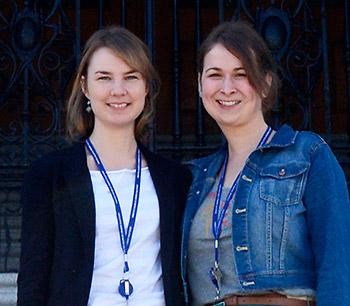Two Simon Fraser University students with a Powell River connection were chosen for the Legislative Internship program within the BC Legislature this year.
Carly Aasen is from Powell River and was one of the few chosen among many who applied to the program. “My ministry placement was with children and family development, where I had the opportunity to work both in the policy department and to job-shadow a couple of children and youth with special needs social workers,” Aasen said. “Now I’m in the research department for the official opposition.”
She said she has also taken part in assisting with the estimates process for several MLAs whose critic files are health-related.
“Last week, I spent five days working in Shane Simpson’s constituency office in East Vancouver,” she said. “So for someone who is interested in going into a masters of social work program, the internship has been applicable and interesting.”
Aasen said the program has provided her with a better understanding of how provincial politics works. “It’s one thing to study political science in the classroom, but you get an entirely different perspective attending question period or watching a media scrum outside of the legislative assembly chamber.”
She would encourage any graduate student with a general interest in how the province is governed to apply for the internship program.
Another student, Vancouver-based Esther Rzeplinski, was also chosen for the program and was stationed, during the constituency week component, to MLA Nicholas Simons’ office both on the Lower Sunshine Coast and in Powell River.
Rzeplinski said the students were divided between house and opposition, and were able to weigh in on where their preference was, if any. “I’m in opposition research and communications, which allows me to touch on some of the historical aspects of policy development. I also work with the Public Education Office there, where I take school students on tour of the legislature.”
During her final year of a bachelor’s degree in history, Rzeplinski took an urban public policy class and quickly began to lean toward a career in political science. “Initially when I applied for the program I was interested in learning how the government uses history in policy development,” she explained. “But I was somewhat disappointed to realize it does not factor in as much as I had hoped.”
Rzeplinski explained that historic context does set the tone for new policy development, but outside that there is a limited play with respect to deeper historical leanings.
“It was within my work at the parliamentary tour office I felt the history component of the program complimented what I was doing,” she said. “The fact that history isn’t as big a deal as I at first thought is largely because there is such a pressure-cooker environment in legislature. There is fast turnover of issues to move through all of the policy questions and issues of the day. There is not much time to delve as deep as we might like.”
Rzeplinski explained that, during elections, candidates form their policy frameworks from what their assigned election platform might be, so there again the use of historical details is limited.
“One of the main challenges in the program was staying non-partisan as a student in such a heavily weighted partisan environment,” she said. “All of us in the program have our individual political leanings and views, but for the sake of the program we can’t get involved in party politics. It’s tricky being in a partisan atmosphere but having to stay non-partisan, even in daily conversations.”
About her time in Powell River, she said, “It has been interesting to see how passionate and involved people here are about local issues. People get involved and talk about it. In many places the opposite is true.”



